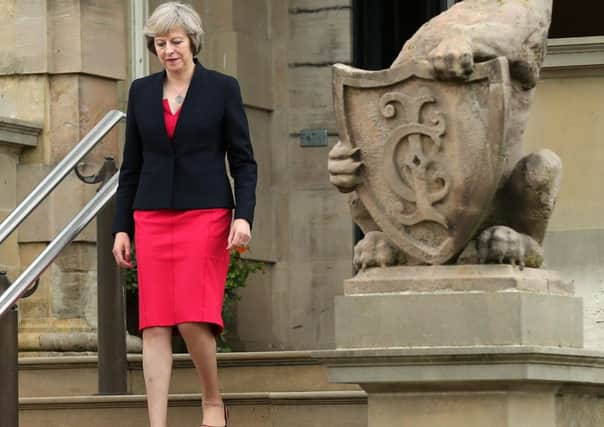Ben Lowry: Memo to Theresa May '“ Look how the Human Rights Act is applied in NI


The suggestion provoked fierce opposition from liberal-minded politicians.
Even Tory colleagues of Mrs May’s have clashed with her on the proposal, notably the MP Dominic Grieve, a former attorney general who has repeatedly made clear his opposition to such a step.
Advertisement
Hide AdAdvertisement
Hide AdBut Mrs May survived in the toughest ministerial portfolio in politics, the Home Office, for six years, where she came to see how the convention delayed the extradition of the Islamic fanatic Abu Hamza and the deportation of the Islamic extremist Abu Qatada.
Britain adopted the convention in 1951 but it was almost half a century before it was incorporated into UK law under Tony Blair’s 1998 Human Rights Act (HRA).
The HRA meant you could argue for your convention rights in a UK court rather than having to go to Strasbourg as a final arbiter.
The act has been cited in relation to controversial bail decisions in Northern Ireland cases involving dissident republican charges.
Advertisement
Hide AdAdvertisement
Hide AdLast week this column looked at the alarming handling of key elements of the dissident threat, including short prison terms.
The preceding week Conal Corbett, 20, of Victoria Parade in Belfast, avoided jail for offences linked to a bomb plot which could have killed police.
It also emerged that week that three dissident terrorists are already out of prison less than two years after they had been jailed for a plot to murder police and a judge that was foiled by painstaking security force work.
But since last week’s article, bail decisions have been in the spotlight and it is in them that the influence of HRA is most evident.
Advertisement
Hide AdAdvertisement
Hide AdChristopher Robinson, the man charged with murdering Adrian Ismay, again breached his bail conditions and again was given another chance by a judge.
Robinson, 46, of Aspen Park Dunmurry, had been granted bail in May despite it being a murder charge, but he had not answered the door to police the very first night of his release as per the terms of his curfew.
He was brought before court and released again, but the next night there was an issue with his tag and he was once more put in court – but freed again by another judge.
His defence solicitor Padraig O Muirigh even cited the two unsuccessful bids within 48 hours to return him to jail. He said: “My client is concerned this is the start of a campaign of harassment against him while he’s on bail.”
Advertisement
Hide AdAdvertisement
Hide AdEarlier this month Robinson did not return from the West Belfast festival in time for his curfew. Then on Monday a court heard that the accused failed to sign in with the PSNI by an arranged time because he had slept in.
When in May this newspaper asked why continuing bail had been granted, despite the initial breaches and the opposition of police and prosecutors, a courts service spokeswoman said: “Since the incorporation of the European Convention on Human Rights into domestic law through the HRA, the judiciary are obliged to release applicants on bail unless certain circumstances are established in court. There is a presumption of innocence and therefore in favour granting of bail.”
When we asked again this week why bail had been granted after further breaches and further PSNI opposition, a spokeswoman gave the same comment that cites the HRA.
Also last week, Damien McLaughlin, 39, from Kilmascally Road in Dungannon, charged in connection with the murder of the prison officer David Black, had his bail conditions relaxed so that he could go a spa break.
Advertisement
Hide AdAdvertisement
Hide AdLast week the dissident Dee Fennell, 34, who faces charges in relation to a speech he gave at a republican commemoration, had his bail amended so he could have a holiday in Donegal. The terms prevent him speaking at, but not attending, republican gatherings such as one the will be taking place in Bundoran, Donegal, during his time in the county.
There have been instances of people on bail attending dissident events.
Mrs May has a lot on her plate, as does her new Northern Ireland secretary, James Brokenshire, but they both have expert advice and government departments to keep them informed of events.
It is to be hoped that security and intelligence service concerns about these wider issues are being relayed to the NIO and Downing Street and that the impact of the HRA in NI is being monitored by government, despite Dublin’s unhappiness at plans to repeal the act.
Advertisement
Hide AdAdvertisement
Hide AdMrs May shows no sign now of quitting the ECHR. An emerging compromise has the UK stay but the HRA replaced with a Bill of Rights.
Meanwhile, I anticipate rising pressure on the ECHR to reform in coming years. Other western countries will come to see what we have known for decades, about terror groups and human rights provisions.
What about the right to life of civilians, their citizens will demand?
Ben Lowry (@BenLowry2) is News Letter deputy editor